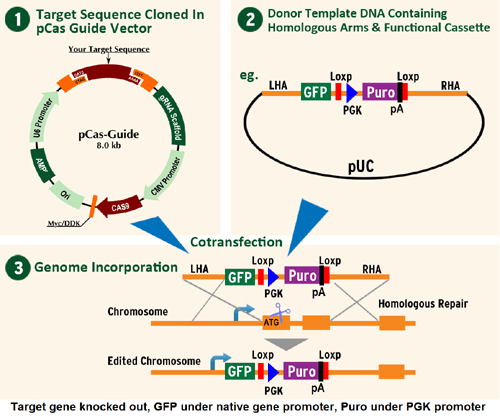FGFR1 Human Gene Knockout Kit (CRISPR)
CAT#: KN202080
FGFR1 - human gene knockout kit via CRISPR, HDR mediated
HDR-mediated knockout kit validation
USD 1,290.00
4 Weeks*
Specifications
| Product Data | |
| Format | 2 gRNA vectors, 1 GFP-puro donor, 1 scramble control |
| Donor DNA | GFP-puro |
| Symbol | FGFR1 |
| Locus ID | 2260 |
| Disclaimer | The kit is designed based on the best knowledge of CRISPR technology. The system has been functionally validated for knocking-in the cassette downstream the native promoter. The efficiency of the knock-out varies due to the nature of the biology and the complexity of the experimental process. |
| Reference Data | |
| RefSeq | NM_000604, NM_001174063, NM_001174064, NM_001174065, NM_001174066, NM_001174067, NM_015850, NM_023105, NM_023106, NM_023107, NM_023108, NM_023109, NM_023110, NM_023111, NM_032191, NM_001354367, NM_001354368, NM_001354369, NM_001354370 |
| Synonyms | BFGFR; C-FGR; CD331; CEK; FLG; FLT2; H2; H3; H4; H5; KAL2; N-SAM |
| Summary | 'The protein encoded by this gene is a member of the fibroblast growth factor receptor (FGFR) family, where amino acid sequence is highly conserved between members and throughout evolution. FGFR family members differ from one another in their ligand affinities and tissue distribution. A full-length representative protein consists of an extracellular region, composed of three immunoglobulin-like domains, a single hydrophobic membrane-spanning segment and a cytoplasmic tyrosine kinase domain. The extracellular portion of the protein interacts with fibroblast growth factors, setting in motion a cascade of downstream signals, ultimately influencing mitogenesis and differentiation. This particular family member binds both acidic and basic fibroblast growth factors and is involved in limb induction. Mutations in this gene have been associated with Pfeiffer syndrome, Jackson-Weiss syndrome, Antley-Bixler syndrome, osteoglophonic dysplasia, and autosomal dominant Kallmann syndrome 2. Chromosomal aberrations involving this gene are associated with stem cell myeloproliferative disorder and stem cell leukemia lymphoma syndrome. Alternatively spliced variants which encode different protein isoforms have been described; however, not all variants have been fully characterized. [provided by RefSeq, Jul 2008]' |
Documents
| Product Manuals |
| FAQs |
Resources
Other Versions
| SKU | Description | Size | Price |
|---|---|---|---|
| KN202080BN | FGFR1 - human gene knockout kit via CRISPR, HDR mediated |
USD 1,290.00 |
|
| KN202080LP | FGFR1 - human gene knockout kit via CRISPR, HDR mediated |
USD 1,290.00 |
|
| KN202080RB | FGFR1 - human gene knockout kit via CRISPR, HDR mediated |
USD 1,290.00 |
|
| KN402080 | FGFR1 - KN2.0, Human gene knockout kit via CRISPR, non-homology mediated. |
USD 1,290.00 |
|
| GA101583 | FGFR1 CRISPRa kit - CRISPR gene activation of human fibroblast growth factor receptor 1 |
USD 1,290.00 |
{0} Product Review(s)
Be the first one to submit a review






























































































































































































































































 Germany
Germany
 Japan
Japan
 United Kingdom
United Kingdom
 China
China
